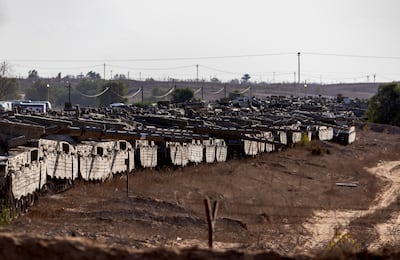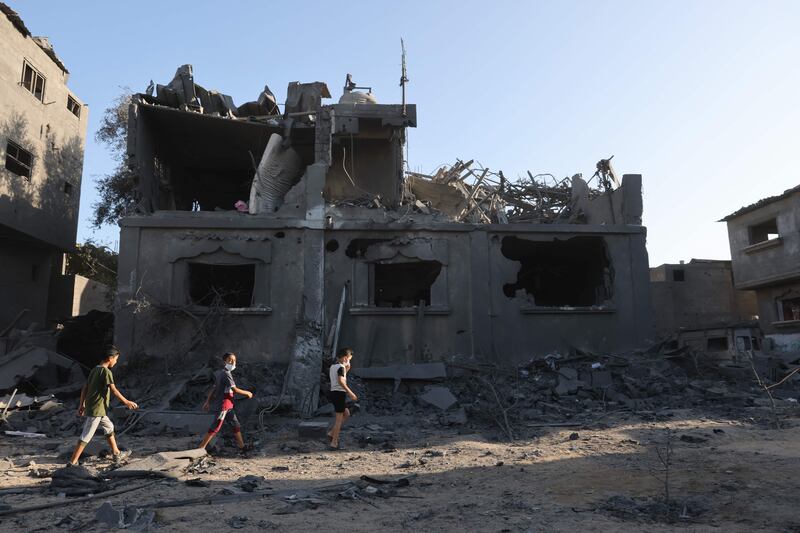Live updates: Follow the latest news on Israel-Gaza
Israel has lost “world sympathy” due to its actions in Gaza, which could fuel a much wider regional crisis, a leading Israeli-born academic has told The National.
Yossi Mekelberg warned that the conflict had reached a “boiling point” with the deaths of more than 8,000 Palestinian civilians, inexorably heightening the risk of spillover to other parts of the region.
The high civilian death toll reported by the Hamas-run Gaza Health Ministry, which includes 2,700 children, is also having a detrimental effect on Israel’s mission to destroy the militant group by potentially sending more Palestinians into its ranks, he said.
“We are reaching a really crucial point in this conflict because it's starting to boil over,” said the Chatham House think tank Middle East expert.
“Obviously there was world sympathy for Israel’s loss, but Israel is responding in the way that it responds, and I think there is a big shift here.
“They felt that they needed to react with as much power as possible to stabilise the situation and to restore some deterrence but in this process, so many civilians have been killed on the Palestinian side, which is having a destabilising impact on the region.”

Boiling point
While many Middle East countries would not “mind to seeing the demise of Hamas”, the impact of the deaths of so many innocent people was “affecting their own societies and their own stability”.
“The rhetoric is getting worse and worse so we're getting to a boiling point that can be really, really dangerous,” said the academic, who is originally from Tel Aviv but is now living in England.
Within three weeks of war, there have been more deaths than during the four years of the Second Intifada, which ended in 2005 with 3,000 Palestinians and 1,000 Israelis dead – but he added the spotlight was enhanced due to instant reporting via social media.
Miscalculation escalation
While Hezbollah and Iran have yet to become overtly involved in the war, mounting pressure from the Gaza assault might force them in, he suggested.
“The death and destruction gets you to a point where you expect certain actors to do something about it,” said the academic, who also lectures at Regent’s University, London.
“Hezbollah might feel that they have to do more than they're doing now and then there will be an Israeli response followed by an even harsher response.”
Iran was also trying to stay on the sidelines, as “it loves proxy wars”, but it could also be drawn in, as could the US, which has positioned two US aircraft carriers in the Mediterranean.
“My main fear is a miscalculation, because in this situation there's always going to be someone miscalculating a missile that hits a target for which it was not intended and then we are in a new situation,” he said.

Hamas void
Prof Mekelberg argued that it appeared Israel had embarked on a military campaign without a “grand plan” other than to eliminate Hamas.
“But what does it mean destroying Hamas? Hamas is a political movement, it's a military movement but most importantly it's an ideology, it didn't come out of nothing,” he said.
“Even if you destroy a lot of its military capability and political force by this massive bombardment and the massive killing, it will push more Palestinians into the hands, if not of Hamas, but a similar organisation that will again fill the void if Hamas is gone.”

Complex two-state solution
In the midst of conflict, it was difficult to consider a postwar settlement based on the decades old “two-state solution” of Palestine and Israel as individual sovereign nations.
Prof Mekelberg suggested that, with 500,000 Jewish settlers in the West Bank and 220,000 in East Jerusalem, it would have to be a “complex two-state solution” that would require a “creative approach”.
“But the tragic irony of all of this is that it takes this [war] for people to go back to what probably should have been done many years ago.”
He added that neither Israel, Egypt or the Palestinian Authority were likely to want to take over Gaza after the war, with the likelihood of an “international regional mechanism” in charge until an election could be held to choose a legitimate government.
“But this gazing into the future is probably for another day as right now we're in the middle of a war,” he added.







